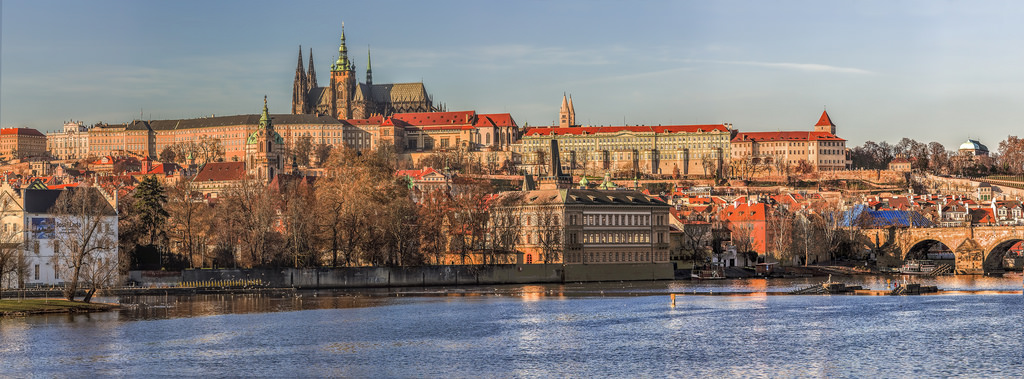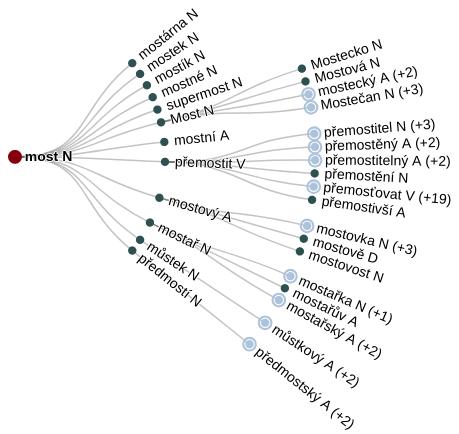CALL FOR PAPERS
FIRST CALL FOR PAPERS
The Second International Workshop on Resources and Tools for Derivational Morphology (DeriMo 2019) will be held in Prague, Czech Republic, on September 19 and 20, 2019, at the Faculty of Mathematics and Physics of Charles University.
The Prague edition of the workshop will continue and push forward the discussion on language resources and tools for derivational morphology (and, more generally, on word formation) as started at the first DeriMo workshop (DeriMo 2017), which took place in Milan, Italy, in October 2017.
DeriMo 2019 will provide an international platform for presentation of new developments in existing word-formation resources and for introduction of recently created ones. A debate is expected on all aspects of creation of these resources, from technical solutions to linguistic decisions on which word-formation processes and how they are modelled in the resource. DeriMo 2019 wants to cover modern as well as ancient languages and welcomes approaches with a potentially multi-lingual focus. Availability of appropriate tools is considered essential not only for the resource development but also for potential use of word-formation data in both Natural Language Processing and linguistic descriptions. Another goal of DeriMo 2019 is to bring the state-of-the-art approaches to modelling word-formation closer to current linguistic accounts of word formation. Presentations of any type of linguistic research into word formation are expected to contribute to a discussion on usage and usability of available resources and tools. Linguistic insights into the phenomena that are modelled in the word-formation resources may indicate directions of future research, whether with language-specific, cross-lingual, multi-lingual, or typological perspectives.
TOPICS
DeriMo 2019 aims to cover a wide range of topics. Submissions are invited for presentations featuring high quality, previously unpublished research, both completed and ongoing, with an emphasis on novel approaches, methods, ideas, and perspectives, whether descriptive, theoretical, formal or computational. In particular, the topics to be addressed in the workshop include (but are not limited to) the following:
- language resources for word-formation either of individual languages, or with a multi-lingual focus,
- representation of word-formation processes in the resources (models based on base-derivative pairs, paradigmatic models, or other representations),
- enhancement of word-formation resources with other features (e.g. semantic categories in affixation, classification of compounds),
- linking word-formation resources with other types of annotation (e.g. syntactic, semantic),
- application of (semi-)automatic methods in modelling word formation,
- tools for creating, searching etc. of word-formation resources,
- data-based linguistic research in any aspect of word-formation (of individual languages, with contrastive or comparative focus, diachronic perspectives etc.),
- theoretical accounts of word-formation issues.
Proceedings will be published, open-access, in time for the workshop.
INVITED SPEAKERS
We are honoured to announce that Prof. Lívia Körtvélyessy (Pavol Jozef Šafárik University in Košice, Slovakia) and Prof. Fiammetta Namer (Université de Lorraine, France) have accepted our invitation to give plenary talks at the DeriMo 2019 workshop in Prague.
IMPORTANT DATES
-
Deadline for long abstract submission: 24 May 2019 - Extended deadline for long abstract submission: 31 May 2019
- Notification of acceptance: 30 June 2019
- Registration open: 1 July 2019
- Final papers due (camera-ready): 15 August 2019
- Early registration closed: 22 August 2019
- The workshop: 19-20 September 2019
INSTRUCTIONS FOR SUBMISSION
We invite to submit long abstracts describing original, unpublished research related to the topics of the workshop. Abstracts should not exceed 5 pages (references included).
The language of the workshop is English. All abstracts must be submitted in well-checked English.
Abstracts should be submitted in PDF format only. Submissions have to be made via the EasyChair page of the workshop at https://easychair.org/conferences/?conf=derimo2019. Please, first register at EasyChair if you do not have an EasyChair account.
The style guidelines to follow for the paper can be found here: http://ufal.mff.cuni.cz/derimo2019/instructions.php
Please, note that as reviewing will be double-blind, the abstract should not include the authors' names and affiliations or any references to web-sites, project names etc. revealing the authors' identity. Furthermore, any self-reference should be avoided. For instance, instead of "We previously showed (Brown, 2001)...", use citations such as "Brown previously showed (Brown, 2001)...".
Each submitted abstract will be reviewed by three members of the programme committee.
The authors of the accepted abstracts will be required to submit the full version of their paper, which may be extended up to 10 pages (references included).
ORAL PRESENTATIONS
The oral presentations at the workshop will be 30 minutes long (25 minutes for presentation and 5 minutes for questions and discussion).PROGRAMME COMMITTEE CHAIRS
- Magda Ševčíková (ÚFAL, Charles University, Prague)
- Zdeněk Žabokrtský (ÚFAL, Charles University, Prague)
- Eleonora Litta Modignani Picozzi (CIRCSE, Università Cattolica del Sacro Cuore, Milan)
- Marco Passarotti (CIRCSE, Università Cattolica del Sacro Cuore, Milan)
PROGRAMME COMMITTEE MEMBERS
- Mark Aronoff (USA)
- Alexandra Bagasheva (Bulgaria)
- Jim Blevins (UK)
- Olivier Bonami (France)
- Nicola Grandi (Italy)
- Pius ten Hacken (Austria)
- Nabil Hathout (France)
- Andrew Hippisley (USA)
- Claudio Iacobini (Italy)
- Sandra Kübler (USA)
- Silvia Luraghi (Italy)
- Francesco Mambrini (Germany)
- Fabio Montermini (France)
- Fiammetta Namer (France)
- Sebastian Padó (Germany)
- Renáta Panocová (Slovakia)
- Vito Pirrelli (Italy)
- Lucie Pultrová (Czech Republic)
- Jan Radimský (Czech Republic)
- Andrew Spencer (UK)
- Pavol Štekauer (Slovakia)
- Pavel Štichauer (Czech Republic)
- Salvador Valera (Spain)

